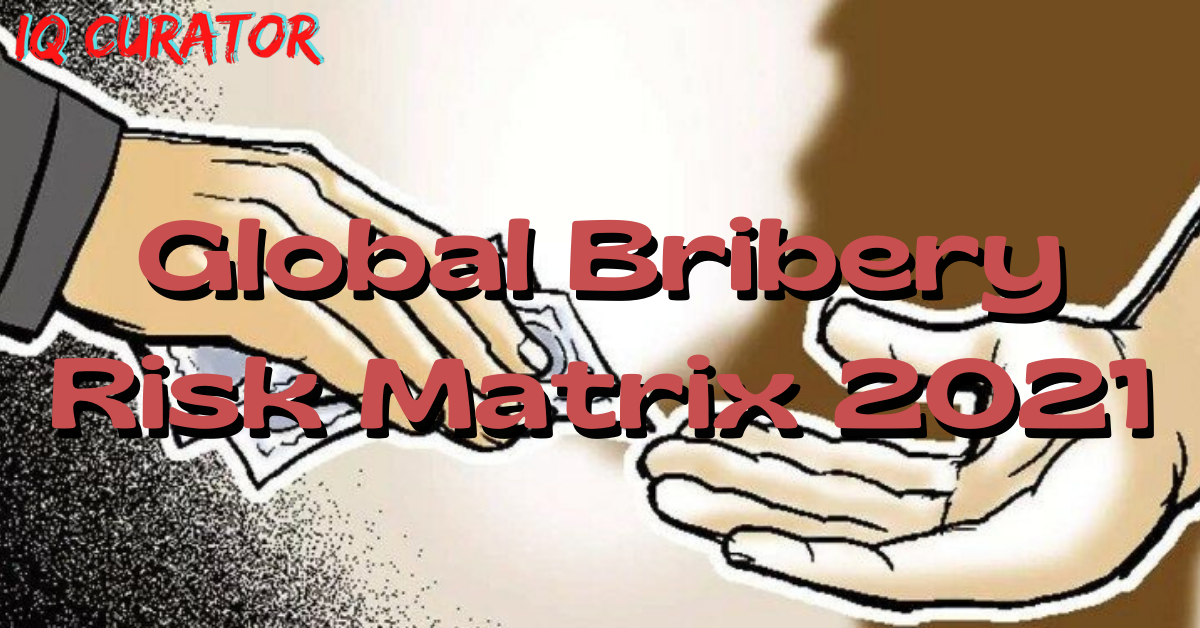The Anti-Bribery Standards Organization (TRACE) recently released the 'Global Bribery Risk Matrix-2021'.
 |
| (Global Bribery Risk Matrix-2021) |
About the Bribery Risk Matrix
It measures the risk of bribery in 194 countries, territories and autonomous and semi-autonomous regions.
It was originally published in 2014 to meet the business community's need for more reliable and accurate information on the risks of commercial bribery.
It collects relevant data from major public interest and international organizations, including the United Nations, the World Bank, the V-Dem Institute (Varieties of Democracy (V-Dem)) at Gothenburg University (Sweden), and the World Economic Forum.
Method of Calculation: Score is Calculated based on Four Factors
Enforcement and anti-bribery detention.
Trade negotiations with the government.
Transparency in government and civil service.
Ability to monitor civil society, including the role of the media.
Exhibitions from Different Countries
India:
In the year 2021, India has slipped five places from last year's 77th position to 82nd position.
In the year 2020, India was ranked 77th with a score of 45 while this year India was ranked 82nd with a score of 44.
India outperformed its neighbors Pakistan, China, Nepal and Bangladesh. However, Bhutan is ranked 62nd.
World:
North Korea, Turkmenistan, Venezuela and Eritrea have the highest risk of commercial bribery, while Denmark, Norway, Finland, Sweden and New Zealand have the lowest risk.
The bribery risk environment in the United States has worsened over the past five years compared to global trends.
From 2020 to 2021, the risk of commercial bribery has increased in all Gulf Cooperation Council (GCC) countries.
Relevant steps taken by India: Following its commitment to "zero tolerance against corruption", India has taken a number of steps to combat corruption, including the following:
Systemic reforms to provide transparent citizen-friendly services and reduce corruption. These include:
Distribution of welfare benefits directly to the citizens under various schemes of the government in a transparent manner through the Direct Benefit Transfer Initiative.
Implementation of e-tendering in public procurement.
Introduction to e-Governance and system simplification.
Government e-marketplace (GeM) has launched government procurement.
Prevention of Corruption Act, 1988:
It clearly criminalizes the act of bribery and will help prevent large-scale corruption through senior management of commercial entities.
The Central Vigilance Commission (CVC), through various orders and circulars, has recommended the adoption of an integrity treaty for all organizations in key procurement activities and to ensure an effective and speedy investigation wherever any irregularities / malpractices are found.
The Lokpal is governed by a chairman and appointed members.
The Ombudsman has statutory powers under the Prevention of Corruption Act, 1988 to directly receive and investigate complaints regarding alleged offenses against public servants.
Welcome to IQ Curator’s General Knowledge - All Competitive Exams Questions - Answers Section. This section is a various topics & category-wise archive of IQ Curator’s GK (General Knowledge) Questions – 2021-2022 in Short MCQs format on various subjects and states. This section is suitable for aspirants preparing for UPSC-IAS, SSC-CGL and State Level Examinations of various states and also UPSC conducted NDA/ CDS/ IFS/ IES / CSE, SSC, Banking / IBPS, IAS, NTSE, CLAT, Railways, NDA, CDS, Judiciary, UPPSC, RPSC, GPSC, MPSC, MPPSC ,etc. examinations.
Please Click Here for : First Audit Day: CAG-Comptroller and Auditor General of India.
You may also Click Here for : General Knowledge - All Competitive Exams

